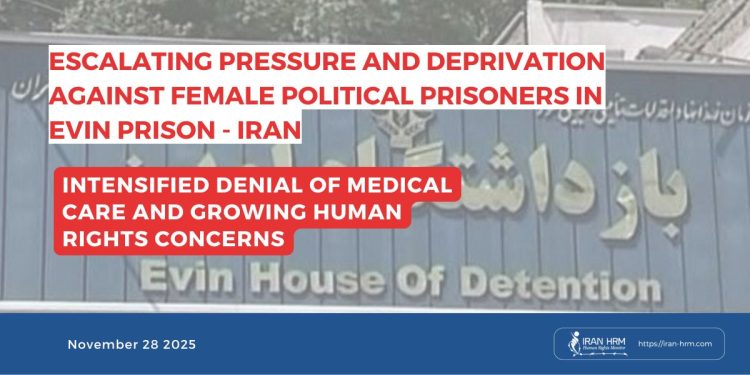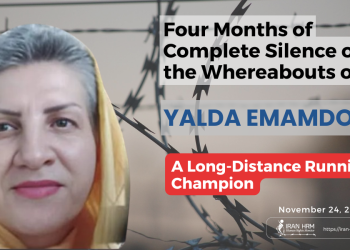Recent reports from the women’s ward of Evin Prison indicate that new restrictive measures and intensified security pressure have been imposed on female political prisoners in recent weeks. The complete termination of basic food rations, the shutdown of the ward’s kitchen, sharp increases in the price of essential goods, and the reduction of visits from once every two weeks to once a month have all severely worsened living conditions. Families state that the cost of providing even the most basic items has become “unbearably high,” while the psychological strain caused by reduced visits is clearly visible among prisoners.
Simultaneously, access to medical care has faced further obstruction due to deliberate delays, security interference, and lack of essential medication. According to relatives, “neglect in Evin has reached a dangerous stage and now threatens the health and safety of the women held there.”
Deteriorating Environmental and Sanitary Conditions in Ward 6
Ward 6, located in the basement of Evin Prison, is maintained in extremely poor condition. Persistent humidity, thick and polluted air, damp walls, and the smell of mold and sewage have made the environment suffocating. Many women report respiratory problems, chronic headaches, and joint pain as a result. There are also numerous reports of large rats moving freely between rooms and corridors, posing serious sanitary and safety risks.
Damage from past attacks and fires on Evin Prison remains visible, and no meaningful repair or restoration work has taken place. The deteriorating environment—combined with overcrowding and lack of basic supplies—has made living conditions intolerable, particularly for elderly or chronically ill prisoners.
Population and Extensive Medical Needs
The women’s ward houses around 60 political prisoners and 6 prisoners sentenced on financial charges. More than ten of the women are over 60 years old, many of whom require continuous medical care. A significant number suffer from serious illnesses such as cancer, multiple sclerosis, heart disease, diabetes, rheumatism, and severe spinal disorders. Access to medication, medical referrals, and specialized treatment is severely restricted—and in many cases has been halted altogether.
Depriving political and religious prisoners of necessary medical treatment is a deliberate and systematic policy aimed at breaking their resistance through physical and psychological erosion.
Three Illustrative Cases of Medical Deprivation in Evin
Aida Najaflou: Spinal Fracture and Return to Prison Without Treatment
On 1 November 2025, Christian convert and prisoner of conscience Aida Najaflou fell from a double bunk bed and suffered a T12 spinal fracture. Although the injury was confirmed at the hospital, she was returned to Evin Prison without receiving any treatment, despite being unable to move. After protests by fellow prisoners, she was taken to a second hospital, but effective treatment has still been delayed and her condition remains critical.
Najaflou had repeatedly requested permission to sleep on a lower bunk due to rheumatism and chronic back pain, but her requests were ignored. Her fall and spinal fracture were the direct result of this systematic neglect. She currently survives on strong painkillers and the help of cellmates, while lack of urgent surgery poses a risk of permanent damage or paralysis.
Marziyeh Farsi: Escalating Cancer and Heart Disease Amid Medical Neglect
Political prisoner Marziyeh Farsi, born in 1967 and suffering from cancer and heart disease, has faced severe dizziness, chronic headaches, and increasing weakness in recent weeks. Although her specialist prescribed essential medication to prevent cancer progression, Evin authorities have repeatedly blocked its entry. Medical transfers are either endlessly delayed or canceled moments before they occur.
Her untreated condition is rapidly deteriorating, and there is now a serious risk of full cancer recurrence. She remains in the women’s ward without access to essential medical care, and her physical condition is described as “dangerously unstable.”
Shiva Esmaeili: Immobility and Security Obstruction of Treatment
Political prisoner Shiva Esmaeili, born in 1965, developed severe back and spinal pain after her transfer to Qarchak Prison. Despite being returned to Evin, she remains unable to move independently and requires assistance for daily tasks. The Ministry of Intelligence and prison authorities have repeatedly blocked her transfer to specialized medical facilities.
She is now largely immobilized, relies on strong painkillers, and has also been denied contact with her children—an additional source of psychological suffering that has worsened her physical decline.
Women at Risk of Execution, Heavy Sentences, and Mothers in Prison
In Evin’s women’s ward, several political prisoners face the threat of execution, including Verisheh Moradi, Pakhshan Azizi, and Nasimeh Eslamzehi. Others, including Forough Taghipour and Marziyeh Farsi, are serving long-term sentences. Some prisoners—such as Shiva Esmaeili and Zahra Safaei—were arrested alongside their children, who now live in conditions far below basic standards of health and safety.
Sunni women from Afghanistan, Tajikistan, India, and Jordan are also held in separate, inadequately equipped cells. Two of these women gave birth inside Evin and lack access to infant formula or basic newborn care.
Human Rights Analysis: Violations of International Law
The conditions in the women’s ward of Evin Prison constitute clear violations of multiple international human rights standards:
- ICCPR, Article 10: the right to humane treatment
- ICESCR, Article 12: the right to health and medical care
- ICCPR, Article 7: prohibition of torture and cruel, inhuman, or degrading treatment
- Convention on the Rights of the Child, Articles 6, 24, 27: protection of mothers and children
- UN Nelson Mandela Rules: immediate access to healthcare; prohibition of deliberate medical delay
Medical deprivation, unsanitary conditions, food insecurity, limited visits, and systematic pressure represent a clear, targeted pattern of abuse against female political prisoners.
Conclusion and Call to Action
The escalating pressure, deprivation, and increasingly harsh restrictions imposed on female political prisoners in Evin Prison demonstrate a systematic state policy based on medical neglect, psychological pressure, and inhuman conditions. Continued lack of access to healthcare, reduced family visits, and worsening sanitary conditions place the lives of dozens of women—especially the elderly and chronically ill—at immediate risk.
Urgent measures are needed to ensure the medical transfer of critically ill prisoners, restore regular family visits, address the conditions of imprisoned mothers and children, lift restrictive measures, and allow independent monitoring of the women’s ward. Despite severe repression, these women continue to show extraordinary resilience, and their voices require immediate and sustained attention from the international human rights community.







